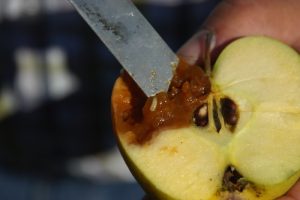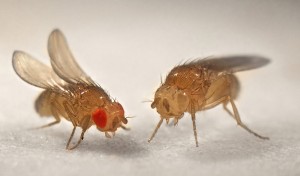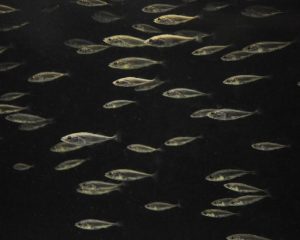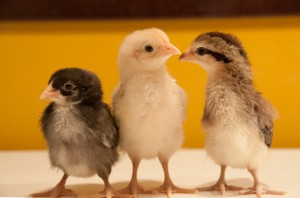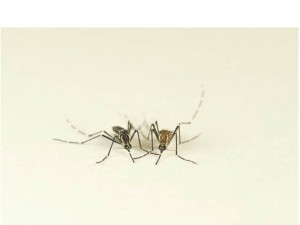Enter your address to receive notifications about new posts to your email.
Articles tagged Behavior
(28 results)
-
Fido won’t fetch? Maybe it’s his pedigree
Whether a thunderclap drives your dog to cower behind the couch or leaves it unfazed may be determined in part by genetics. In the June issue of GENETICS, Ilska et al. analyze genetic contributors to canine personality traits—such as fear of loud noises—using owners’ reports of their pets’ behavior. The researchers chose this survey-based method…
-
A single gene controls multiple feeding-related traits in fruit fly larvae
Fruit fly larvae have one goal: eat as much as possible. After the tiny worm-like larvae hatch from eggs embedded into the flesh of rotting fruit, they eat their way out. After days of gorging, they find a good spot to pupate and then emerge as adults. Fruit flies cannot grow after this transformation, however,…
-
#TAGC16 Shorts: Gut microbes influence alcohol sensitivity
Guest post by Deepika Vasudevan. #TAGC16 Shorts are brief summaries of presentations at The Allied Genetics Conference, a combined meeting of seven genetics research communities held July 13-17, 2016 in Orlando, Florida. The microbes in our guts seem to affect almost every aspect of human health, from the obvious (e.g. metabolism1) to the unexpected (e.g.…
-
Fecal alchemy: Turning poop into genomics gold
When it comes to genotyping technology, poop genetics is stuck in the 1990s. While most geneticists are now awash in genome-scale data from thousands of individuals, those who depend on fecal and other non-invasively collected samples still rely on old-school, boutique panels of a dozen or so genetic markers. But feces — along with fur,…
-
Fish with robot friends: linking genes to behavior
The relative contributions of nature and nurture to behavior are a perennial source of dispute. That there is a genetic component is clear, but frustratingly, only a handful of specific genes are known to directly influence behavior in vertebrates. In the June issue of GENETICS, Greenwood et al. describe how they pinned down one of…
-
Overly fastidious flies shed light on neurofibromatosis
Fruit flies that devote an excessive amount of time to grooming themselves could serve as a powerful tool for understanding the inherited disorder neurofibromatosis, type 1 (NF-1), report researchers in the latest issue of G3: Genes|Genomes|Genetics. NF-1 leads to the development of benign tumors in the peripheral nervous system. Common complications of NF-1…
-
New Faculty Profile: Jennifer Garrison
New Faculty Profiles showcase GSA members who are establishing their first independent labs. If you’d like to be considered for a profile, please complete this form on the GSA website. Jennifer Garrison Assistant Professor Buck Institute for Research on Aging Lab website Research program: We study the relationship between the anatomy of neural…
-
Inducing lifesaving sleep in worms
Sometimes, a nematode worm just needs to take a nap. In fact, its life may depend on it. New research has identified a protein that promotes a sleep-like state in the nematode Caenorhabditis elegans. Without the snooze-inducing molecule, worms are more likely to die when confronted with stressful conditions, report researchers in the March 7, 2016…
-
Behind the Podium: Amita Sehgal, Keynote Speaker at TAGC
In preparation for The Allied Genetics Conference (TAGC), set to take place in Orlando this July, Genes to Genomes is getting the inside scoop from many of the outstanding keynote speakers in our “Behind the Podium” series. In the first of a series of interviews, GSA graduate member Elisabeth Bauerly catches up with Drosophila researcher…
-
Anxious chickens as a model for human behavior
Chickens that “chicken out” in unfamiliar surroundings may shed light on anxiety in humans, according to research published in the January 2016 issue of the journal GENETICS. Domestic chickens are much less anxious than their wild cousins, the red junglefowl. The new research identifies genes that contribute to this behavioral variation and reveals that several…
-
Using evolution to link genes and behavior
Genes to Genomes asked Dr. Carolyn (Lindy) McBride (Princeton University), a recipient of the Rosalind Franklin Award for Young Investigators, to tell us about her research and what it means to receive the award. She was recognized for her Rosalind Franklin Award along with another recipient, Dr. Maria Barna, at the 2015 American Society of Human Genetics…



